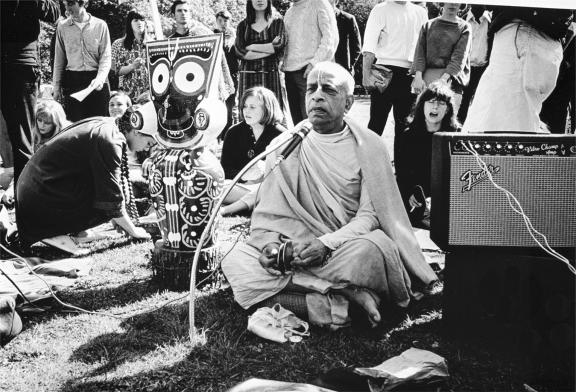
Throughout his life, Śrī Rajanīkānta Basu had been performing bhakti so seriously that neither he nor any of his family would take even water—let alone any food item—unless it had been offered in arcana and received as prasāda. In old age, having understood from Śrīla Jīva Gosvāmī's writings the need to accept a genuine spiritual guru, he disaffiliated himself from the Narottama-parivāra he had been initiated into during childhood and, along with his whole family, found shelter at the lotus feet of Śrīla Bhaktivinoda Ṭhākura.
Although his two eldest sons became initiated by Śrīla Bhaktivinoda, that gentleman waited longer, and was very old when he eventually received dīkṣā from Śrīla Sarasvatī Ṭhākura, with the name Śrī Rādhā-Govinda dāsa Adhikārī. Thereafter Rādhā-Govinda Prabhu resided mostly in Māyāpur, Śrī Gauḍīya Maṭha, or Rādhā-kuṇḍa. Notwithstanding his age, he performed bhajana with such alacrity and fervor that in 1933 Śrīla Sarasvatī Ṭhākura decorated him with the title Bhakti Nidhi (ocean, or treasure, of devotion). Bhakti Nidhi Prabhu would unfailingly attend all Maṭha services, dancing exuberantly and stylishly in kīrtana, and spend several hours daily chanting japa. He would loudly and extensively pronounce jaya-dhvani after ārati, reciting the name of each Maṭha under the Viśva-Vaiṣṇava-rāja Sabhā and the deities therein. He would do the same on the railway platform before departing for a journey, continuing for up to half an hour and thus sometimes missing the train. Among his many jayas was kapaṭa mānuṣa ki jaya!: “Victory to the Deceptive Man!” He would explain that Gaurāṅga is Godhead come in the guise of a man, hence kapaṭa mānuṣa.
Bhakti Nidhi Prabhu was similarly enthusiastic in offering daṇḍavat, and at least once did so 108 times at the lotus feet of his guru-mahārāja. Each year he performed the entire Navadvīpa-dhāma Parikramā on foot, refusing the help of any vehicle, and moreover rendered various services. In 1932 he similarly completed Vraja-maṇḍala Parikramā. When visited by his sons and their families, Bhakti Nidhi Prabhu never discussed worldly affairs with them, but exclusively advised them regarding Hari-bhajana. He had deep taste for Śrīmad-Bhāgavatam, relishing every verse and explaining it to others.
Bhakti Nidhi Prabhu had special affection for small boys, and by distributing mahā-prasāda sweets would induce them to chant harināma. He once told Śrīla Bhaktisiddhānta Sarasvatī, “I am not much welcomed when I go for bhikṣā, because after I give mahā-prasāda to lads they want to follow me, and their parents fear that they'll become sadhus.” Śrīla Bhaktisiddhānta Sarasvatī replied, “It's like people who enjoy scrumptious food in another's house and later nitpick that the yogurt was too sour. Similarly, even though you sincerely perform Hari-sevā, some people will blame you. Don't be disturbed by their querulousness.”
Seeing the eighty-two-year-old Rādhā-Govinda Prabhu as fit for paramahaṁsa-veśa, Śrīla Sarasvatī Ṭhākura inducted him on 5 October 1934, renaming him Śrī Rādhā-Govinda dāsa Bābājī, and on that evening also bestowed the śrī-nṛsiṁha-mantra-rāja and gave to him as prasāda one of his own used outer cloths. * On Śrīla Sarasvatī Ṭhākura's order Rādhā-Govinda dāsa Bābājī relocated to Purī-dhāma, where at Śrī Puruṣottama Maṭha he continued performing bhajana with relish. There he never allowed anyone to render him personal service, being vigilant that no one could do so even clandestinely.
On 4 October 1936 at Śrī Puruṣottama Maṭha, while chanting japa on his beads shortly before 9:40 p.m., Bābājī Mahārāja repeatedly requested the devotees present to perform loud mahāmantra kīrtana and call out the names of guru and Gaurāṅga. Amid their nāma-saṅkīrtana, he breathed his last by uttering the holy names.
~ Śri Bhaktisiddhānta Vaibhava